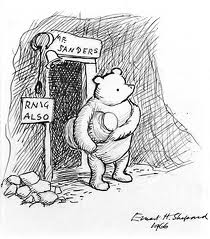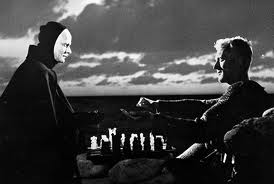Our little family was on one of those cool Hebridean car ferries, traveling from Oban to Mull on our way to Iona, when I first ruminated on the American national trait to share way too much information with total strangers. My five-year old daughter (this was 1989) had just commented, “Duddy, there are lots of Americans on this boat!” I was reminding her that, although we had lived in Britain for several months, we were, in fact, ourselves Americans, when we were set upon by two very friendly Mid-Western American women who had overheard our conversation.
Within minutes we knew where they were from and the names of their children, their children’s spouses, and their grandchildren. And when they discovered I was a minister, they felt compelled to tell me all about their church, their pastor, and all their activities in the congregation.
Perhaps none of this would have struck me as particularly strange if I hadn’t been a foreigner in Britain, but the contrast was evident to me. Everybody in England had been quite pleasant to us during our stay, but with few exceptions maintained a certain reserve that I actually came to appreciate.
When we left Oxford that summer, I said my goodbyes to college dons and staff, and several remarked, “But you’ve only just arrived! We will miss you.” While I believe they were sincere, I was amused by their heartfelt goodbyes in that they had barely given me the time of day.
I liked it in Britain, but I must confess that I’m an American oversharer, and that I come from a family of oversharers. I was one even before my brain injury, which adjusted my social filters to, shall we say, a more porous setting.
I come by it honestly. My Dad, of blessed memory, was at times an oversharer. One Thanksgiving dinner he launched his own campaign of “shock and awe” (shock to the grownups and awe to us kids). My Uncle Dick was expertly carving the turkey with an electric carving knife (remember those?). My Dad felt the need to share that a former secretary of his had committed suicide using such an implement, but his telling was not nearly as discreet as mine here. I suspect that there were lots of leftovers from that meal.
The Internet was made for oversharers. Blogging or updating one’s status on Facebook offer hourly temptations. So in yet another of my high-minded public service offerings, here are my ten guidelines to avoid oversharing:
- Never post on the Internet when you are intoxicated. Trust me on this. You may wake up to see that cute little red flag with lots of numbers in it on your Facebook page, and smile and wonder, “Which of my carefully crafted witty status updates are all my ‘friends’ responding to?” Moments later you are mortified to suddenly remember that last post you made right before bed, which seemed like a good idea at the time. It wasn’t.
- Remember the old adage about the difference between major and minor surgery? “Major surgery is surgery on me, and minor surgery is surgery on someone else.” The same is true for the difference between interesting surgery, and boring surgery. And no surgical scars please. Remember LBJ? Nobody wants to see your scar.
- If you have an interesting story to tell about your friends the Andersons, and you ask your friends the Smiths if they know the Andersons, and the Smiths say, “No,” don’t tell the story.
- If your child or grandchild just learned to use the potty that is a grand thing but don’t share it. Same thing for cute pictures in the tub. Cute now, but the kid might not appreciate it when he’s 13 and the class bully finds it on the Net.
- Your Irritable Bowel Syndrome may well be very preoccupying to you, but it is not of general interest. In my thirty years of pastoral ministry I patiently listened to people’s accounts of their bodily ailments. We call it an “organ recital.” You can and should share such concerns with your pastor and your doctor, but not with the world, and not on the Internet.
- Pastors are notorious for telling cute stories about their children from the pulpit. Everybody loves this, right? Well, no, actually. The children usually don’t. I would ask for permission. Same policy for posting. Children and other family members have a right to privacy. I have sometimes observed this rule in the breach, as my children have noted.
- When I go on vacation I take lots of pictures, and love to look at them again and again to relive the experience. This is something that you want to share with all your friends and dinner guests, right? No. Pictures of other people’s vacations are not everybody’s idea of a good time.
- We live in an age of scientific miracles, and have medications available that can make us feel younger, happier, healthier and, just better. Nobody wants to hear which ones you are on.
- Have a new hobby? Yoga or origami? Just because it excites you doesn’t mean it will excite others. Same for religion. If someone asks you what you believe, don’t lay out your systematic theology. Say, “I’m a Methodist.” Or, “I affirm the Nicene Creed.” A balance between talking and listening is a good anditote against oversharing. Remember Bette Midler’s character in Beaches? She says, “But enough about me, let’s talk about you, what do You think about me?” Don’t be her.
- Tighten up you privacy settings. Not just on Facebook, but in real life. All of us experience ups and downs in our lives. Most of us are battered and worn one way or another. Some of us have had really traumatic events that have left us permanently scarred. How and when (and whether) we share these parts of our story is something each of us must discern in our own way. But such sharing implies some level of trust and intimacy, and although the Internet may sometimes give the appearance of allowing that, it is a risky medium for such sharing. Be careful with yourself and others.
But I’ve shared too much.
(And yes, I know “oversharers” isn’t a recognized word, but it will be. Just watch!)










